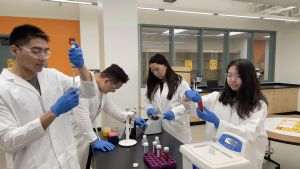
In early 2021 Jared M. Ashcroft opened an email announcing the Community College Innovation Challenge (CCIC) to the Advanced Technological Education community. “Oh, that looks really fun,” was his assessment of the linked website’s description of the national competition that the American Association of Community Colleges offers in partnership with the National Science Foundation.
When he told his chemistry students at Pasadena City College about the contest and the opportunity to win cash prizes for innovative STEM solutions to real-world problems, four students formed a team and asked Ashcroft to be their mentor. Mentoring took his time – an hour or two at a time over several months – but “not a dime” from the budget of the Micro Nano Technology Education Center (MNT-EC) he leads. And, Ashcroft said, the experience was well worth the students’ efforts and his time even if the team had not won first prize.
“If I see an opportunity that looks like I can impact students, I want to do it and figure out a way to support it,” he said.
Ashcroft “loves” the way CCIC teaches teamwork and how to market scientific innovations. This year he has shared information about the 2022 CCIC with the micro and nanotechnology community across the country.
Community college students are encouraged to form two-to-four-person teams now and then begin developing ideas. Each team must explain its innovative solution in a written essay and a 90-second video. Both of these Phase I aspects of the competition are due March 30. For more on how to enter the competition, click here.
Ashcroft says that the PCC team’s successful experience started when members discussed two ideas with an entrepreneur during CCIC’s idea-vetting webinar. “That’s a great session where you can get advice,” he said. AACC and the National Association for Community College Entrepreneurship are offering the interactive online CCIC Application Idea Vetting Session at 2 p.m. (Eastern) February 15. To register, click here.
The PCC team followed the entrepreneur’s advice and developed their concept for the Nano-Bioconjugate Immunotherapeutic, a silver nanoparticle wrapped in gold that they envisioned as a cancer treatment that costs less and has fewer side effects than conventional treatments.
“That’s the thing about the CCIC is like – there’s no limitations. You are not limited to what you can make because it’s all hypothetical,” Ashcroft said in a recent interview.
While the PCC students knew they were not going to make the product for the competition, their idea was based on their personal experiences. They had created nanobiocongugates for a research project that Ashcroft does with students, and they want better treatments to help their relatives who were dealing with cancer.
When they were selected as one of the finalist teams that would be attending CCIC’s Innovation Boot Camp, the PCC team members threw themselves into the preparation assignments.
What Mentors Do

In the first phase of the competition, Ashcroft said he made himself available to the team members on Tuesdays and Thursday during the time when he was in the campus lab. “It wasn’t me saying, ‘We need to meet.’ I don’t work that way. It’s ‘Hey, I’m available. If you need my help, ask, and we’ll meet.’”
Ashcroft thinks he was most helpful when the team qualified for the second phase of the competition, because that is when he utilized his network to help the students. He suggests other CCIC mentors do the same.
In the weeks leading up to the Innovation Boot Camp, students are expected to interview people in industries related to their proposed innovation and use what they learn to refine the pitch presentations they make to a panel of judges. The Innovation Boot Camp is a multi-day event where students receive professional development, mentoring, and coaching to build their strategic communication and entrepreneurial skills. It culminates in a poster session and engagement opportunity with STEM leaders and Congressional stakeholders, and pitch presentations to a panel of industry and entrepreneurial professionals who choose the first, second, and third place winning teams.
Rather than having students rely on cold calls to obtain industry information, Ashcroft gave students contact info for people whose employers partner with MNT-EC. He also emailed those people to let them know students might be contacting them with questions.
Then, when the students had their pitches in good shape he invited Pasadena City College administrators and the college’s marketing staff to listen to the team’s pitch on a Sunday afternoon. He emailed the request to 20 people; 10 attended – including the college president – and asked the students lots of questions. In the midst of this Ashcroft learned that the college had a consultant for the speech and debate team who is available to help PCC students prepare for academic competitions. So that person also reviewed the team’s materials and offered advice on their pitch presentation.
“That’s where I could help as a mentor. I have access to people that could come and give feedback ... I think that’s part of the reason they ended up winning because they had so much practice and so many people who said ‘This is good, and this is not good.’ Credit them, my students took advice. They weren’t stubborn,” he said.
During the Innovation Boot Camp the students learned even more about critical thinking, team work, and how to communicate with people about their work as STEM professionals.
“Being able to talk to industry professionals is really valuable, and it’s a different skill set. The CCIC skill set is ‘Can you market?’ and ‘Can you sell?’ and ‘Are you able to take this product and explain in such a way that someone is going to buy it or wants to support funding it.’ In a way it’s kind of like writing a grant ... we don’t really get those skills in any undergraduate program,” Ashcroft said.
All four PCC team members had been accepted into baccalaureate programs prior to winning first prize at the CCIC, but three of the four landed undergraduate research positions in their first semesters at their transfer institutions.
He thinks having “CCIC prize winner” or “CCIC finalist” on their resumes and being able to talk with interviewers about their CCIC experiences helped the students attain those lab positions.
“That is something that is so unique to community colleges. No one is going to have it. You have a great sort of thing to put on your resume,” Ashcroft said he’s told students during his CCIC pitches this year.
For three students’ perspectives on the CCIC see the Community College Daily article: CCIC Opens Opportunities for Participants

 Subscribe
Subscribe


 See More ATE Impacts
See More ATE Impacts

Comments
There are no comments yet for this entry. Please Log In to post one.